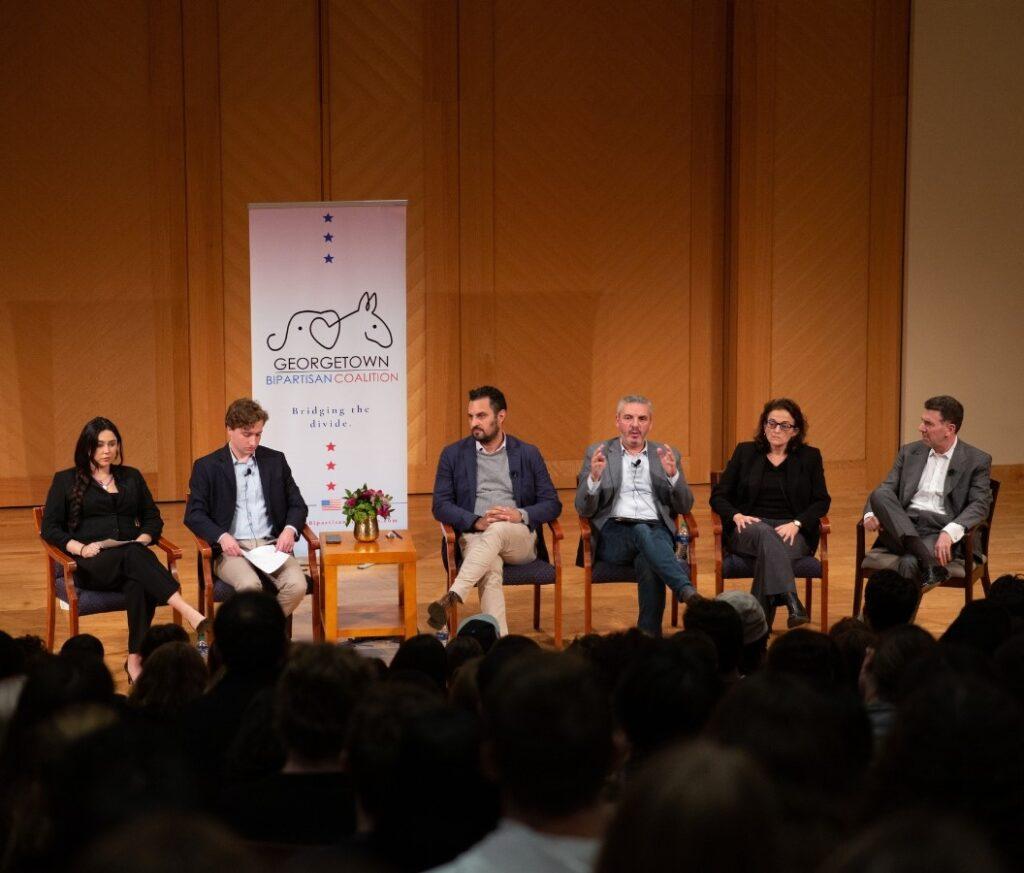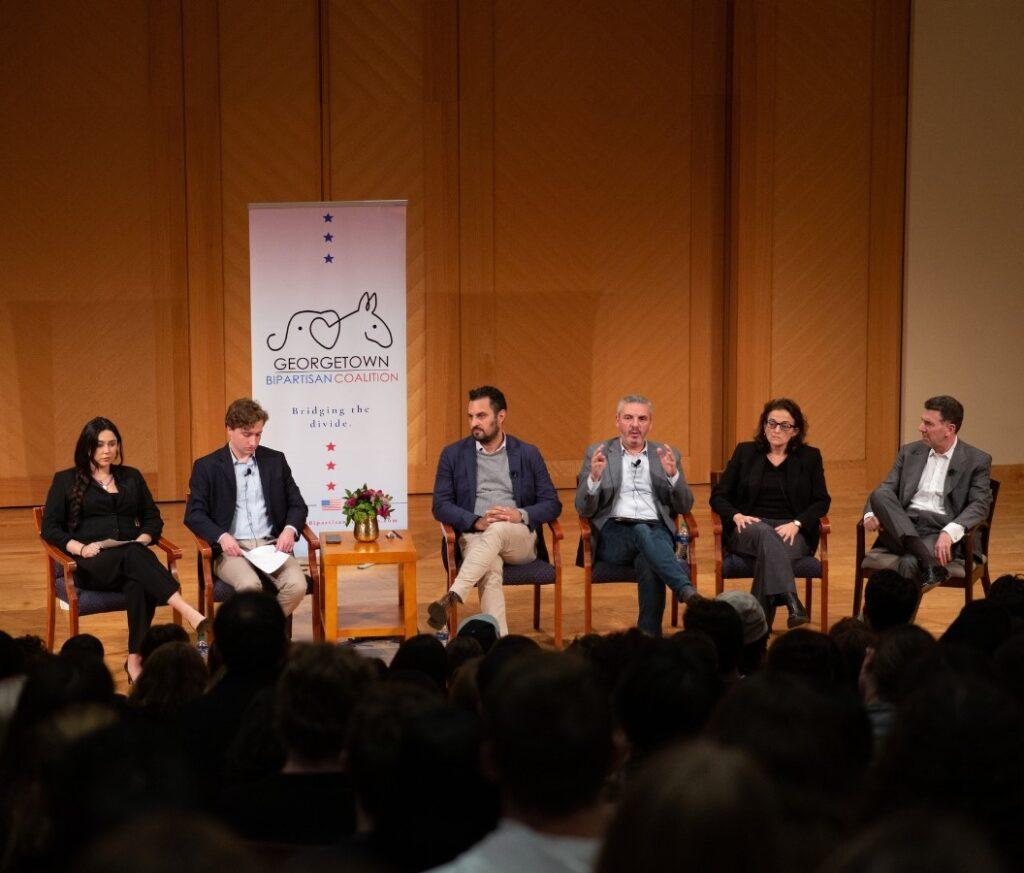Four Georgetown University faculty members came together in a panel Oct. 18 to discuss the reasons behind the ongoing conflict in Israel and Gaza. Panelists criticized U.S. officials’ responses to the attacks by Hamas and Israel and discussed the future of Israel after the active conflict ends.
The event, titled “Understanding the Conflict in Israel and Gaza,” was hosted by the Georgetown Lecture Fund and the Bipartisan Coalition, a student-run organization aimed at promoting civil discourse between political parties. The panel featured two faculty of Georgetown’s Center for Contemporary Arab Studies (CCAS): Fida Adely, associate professor at CCAS, and Khaled Elgindy, adjunct CCAS instructor and senior fellow and director of the Program on Palestine and Palestinian-Israeli Affairs at the Middle East Institute.
The other panelists were Daniel Byman, professor of government and senior fellow at the Brookings Institution’s Center for Middle East Policy, and Jonathan Lincoln, director of the Georgetown Center for Jewish Civilization.
The event was hosted in response to the Oct. 7 attack by Hamas, an Islamist militant movement that is currently one of the two main political parties in Palestine and governs more than two million Palestinians in the Gaza Strip.
Approximately 1,400 Israelis were killed in the attacks and approximately 199 more were kidnapped, according to Israel’s estimates, making Oct. 7 the deadliest day in Israel’s history. As retaliation, Israel launched a series of attacks against Palestinians in the Gaza Strip, killing thousands. Israel has also cut off all food, water and energy supply to Gaza, leaving many Palestinians at risk of starvation and dehydration.
Prior to introducing the panel, Benjamin Oestericher (SFS ’25), one of the event moderators, spoke of the importance of engaging in open intercommunity dialogue despite difficulties when facing such a complex and divisive conflict.
“It might seem hopeless in this moment to engage in bipartisan dialogue when people’s lives communities and even existence are at stake,” Oestericher said at the event. “But we also believe it’s important not to retreat to our own corners, especially those of disinformation and hate speech, as peace and understanding are only possible when we engage with each other.”

Joel Hellman, dean of the School of Foreign Service, started the event with a moment of silence. Michaela Cornejo (SFS ’25), co-moderator of the event, then began the discussion by asking the panelists why they believe Hamas chose to launch attacks against Israel on Oct. 7.
Lincoln answered first, saying that he viewed the conflict as a failure on the part of international institutions.
“I think there’s an overall message of the consequences of failed peace processes and this false notion that these conflicts can somehow be managed,” Lincoln said at the event.
Elgindy added that it is not enough to look at the recent attacks, but that it is necessary to understand the historical events that preceded them.
“I think it’s important also to remember the context in which this is happening because it doesn’t come from nowhere,” Elgindy said at the event. “This has been the deadliest year for Palestinians in the West Bank in two decades.”
Byman said that he believes the only way to end the conflict is for Israel and Palestine to find leadership for Gaza that both find amicable.
Adely said Israel’s repeated attacks target civilians, not Hamas.
“There are Palestinians in Gaza who are not Hamas who are being killed in the thousands,” Adely said at the event. “While political figures are framing this as Israel and Hamas, this is also a war on 2.2 million people who have been under siege for 16 years.”
Adely said that the United States’ response and the language of U.S. politicians have been extremely harmful.
“The role of the U.S. has really just been egregious,” Adely said. “The level at which U.S. officials have repeated genocidal language, like some of our congressmen. Just horrifying the way Palestinians have been talked about by U.S. political officials. ‘Wipe them off the face of the Earth.’ ‘Oh, there are civilians there? I don’t care.’”
Many U.S. politicians have issued statements to weigh in on the Israel-Gaza conflict, with some using language that calls for the killing of Palestinians. U.S. Senator Lindsey Graham (R-S.C.) told Fox News to “level the place” in reference to Gaza. Similarly, Senator Marco Rubio (R-Fla.) posted a tweet Oct. 9 referring to Palestinians as “depraved barbarians.”
The panel then transitioned into a question-and-answer series between the panelists and student members of the audience. The first question asked what makes the Israel-Palestine conflict unique from other global crises, and Elgindy responded that he believes it is the extreme asymmetry of the conflict.
“I don’t see any other conflict in the world that has that scale of asymmetry where on the one hand is a nuclear power and one of the top 16 or 17 militaries in the world,” Elgindy said. “On the other hand, a stateless group of Palestinians with a municipal government at best.”
Adely said students should approach building community and fostering dialogue surrounding Israel and Palestine.
“I think we have an obligation like those of us who are Americans to learn about this issue and engage with it because America is such a huge actor in this conflict,” Adely said. “We talked about kind of calling people out and calling them in. And I think building solidarity and building peace is about educating each other as well.”









